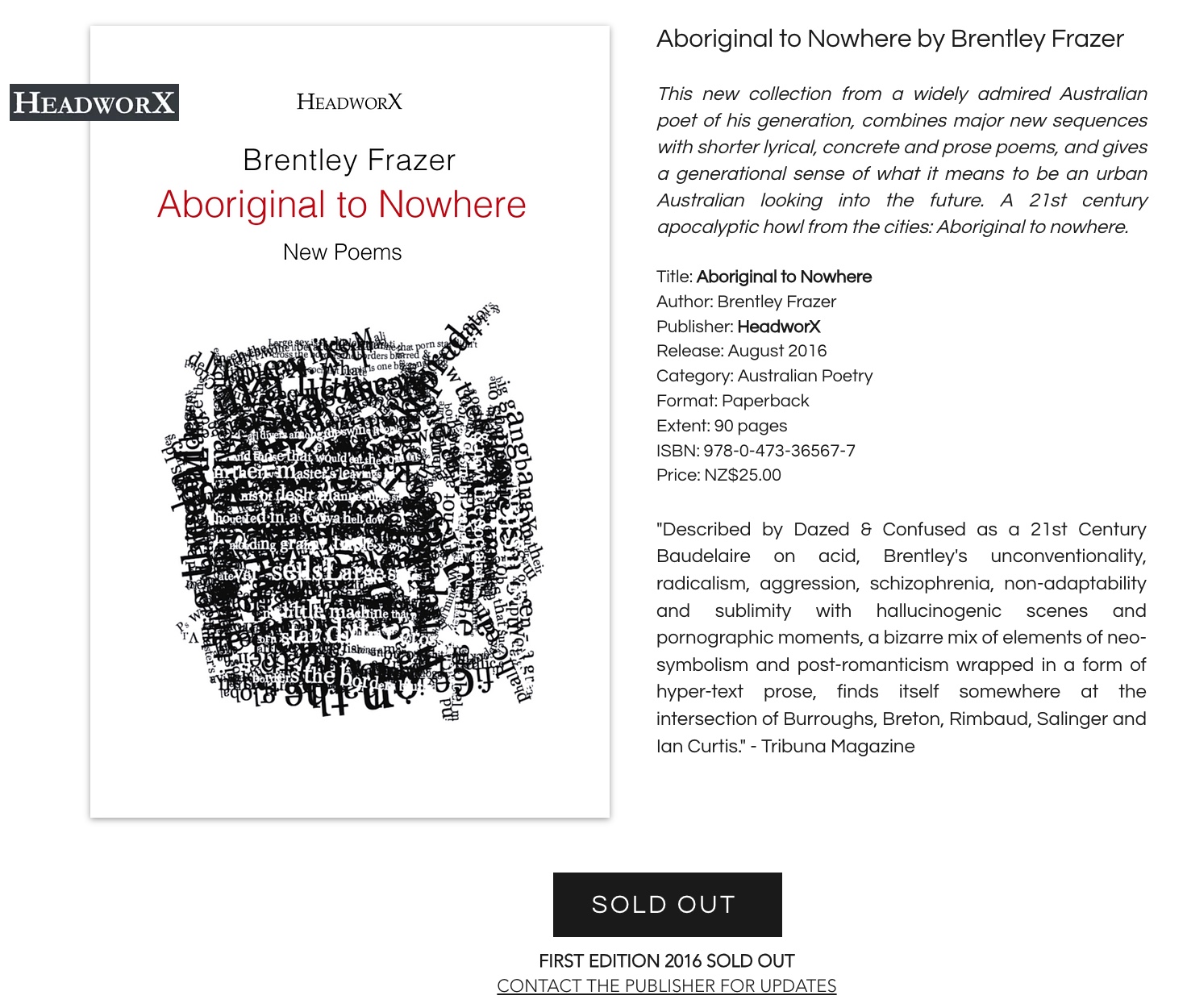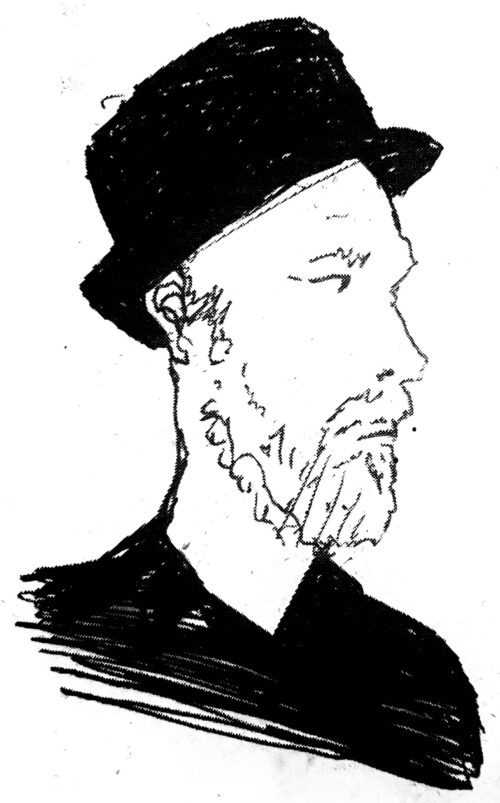Aboriginal to Nowhere new poems by Brentley Frazer HeadworX Publishers NZ 2016

REVIEWS
Review of Aboriginal to Nowhere ~ New Poems
Brentley Frazer’s language is electric, ornate, oddly formed and brilliant, poignant, sometimes surreal images and passages abound. The longer poems have a mixture of sharp, even dazzling writing. The vocabulary is massive, events and situations are charged, and the voice of the poet compelling. These collected meditations rip apart what we image to be ‘order’ . . . Frazer performs his trademark linguistic magic, penetrating everything from personal trauma to world order. In his hand, little is left unnoticed or forgotten by the poet, who has about him both the dreamer and the theorist, whose keen eye infiltrates everything it sees. ~ Takahē Magazine
The centrepiece the collection is the title poem, “Aboriginal to Nowhere”, sub-titled Song Cycle of the Post Modern Dispossessed. The poem is a tour de force in 13 sections that elegizes even as it celebrates the counter-culture suggested in the work. Bentley Frazer’s language is electric, ornate, oddly formed for such subject matter, as the opening lines indicate:
The Citizens Netflix & chill in their minimum eight hundred
thousand dollar concrete sky-coffins in the river city;
streaming a hot series in air conditioning; Gen Y & Millennials
staying in for dinner.
Plate up & Instagram, change the rotation with a PlayStation
control, post a clever meme on Facebook, consider the likes,
speculate on advertising revenue & think of the friend requests.
Much about Frazer’s thematic as well as stylistic aims can be seen in this passage. The poem searches endlessly for hidden, elusive secrets behind the everyday world, one that results naming in the most poetic language.
Here are poems that proceed to pay attention to large-scale social issues. His is an intensely subjective juxtaposition of ambitious ideals and everyday circumstances, as we see in “Cigarettes and Tending Orchids”, a poem about a funeral:
This is him I will always remember.
In my best suit
at his funeral. The apocalyptic
tramp preacher says that before we
know it the worms will have their
way with all of us.
Brilliant, poignant, sometimes surreal images and passages abound: “a few / bullets collected from the washing machine / over time.” (“Forgotten Corpse of a Boy”); ‘Worm on the ruined carpet / an hour before Oscar choked / to death on a bowl of pasta’ (“When Did the Dance End”); ‘Guns & bibles spill / from his jacket.’ (“Vulture Boundary”). Yet it must be said that the longer poems have a mixture of sharp, even dazzling writing. The vocabulary is massive, events and situations are charged, and the voice of the poet compelling. In “Untitled Plane Crash”, for example, Frazer begins the poem:
Let’s roll now, man, the shadows have that dull edge
like nightsticks through phone books on abdomens.
Let’s forget our poverty, if only for this dawn.
The poem gathers momentum for six pages, before ending:
O, should I stay or should I roll in this place I never know.
…
After such energy, it’s good to read some of the shorter poems, such as “Developing”, a simple description of domesticity that engages the reader:
The sky bruised over
slate roofs, the wind
moaning through louvers
leaves brown as coffee
rings.
Another lengthy poem, in five sections, “A Green Pasture”, is dedicated to the Australian poet Les Murray. Here, Frazer is engaged passionately in, not only the present but the past, as we see in this passage:
I remember as a child I met Bob Hawke at an indigenous festival. My father took me down to shake his hand & I felt shy. He said: –Brentley, Brentley, pleased to meet you . . . did you enjoy the corroboree?
Several poems in Aboriginal to Nowhere recall the past, and “A Cacophony of Grey”, in three sections, takes a sombre tone, remembering his aunt’s ‘malnourished arms’, ‘the staggers’ and at centre stage
a new player, jaw set with malice, shoulder coiled for a straight-arm punch, produces a blade and murders her (the audience sprayed with blood). He guts her like a
beast, practiced, precise, with lust. – Beauty. Skin. Deep, he mutters, untouched.
“Elizabeth Arcadia” is a more traditional poem in ten short stanzas. It tells the story of the ninety-nine-year-old Elizabeth Arcadia, which the poet visits on google maps, only to find everything has changed. The poem ends:
Oh, Elizabeth Arcadia
your edge has dulled.
We used you as a thoroughfare
to Archive Books, or a short-cut to Circle on Albert.
Several of Frazer’s best poems focus his technique of associational imagery in a dramatic scene or the beginnings of a narrative thread. “Paris/Abattoir”, for example, which describes the city of Paris, centres on the fact that, deeply though he loves Paris, it is an ‘abattoir’, but it also allows him to recreate the endless stream of kinetic images that assault the senses:
I love Paris though the sun
makes the streets smell feculent
and the discarded fruit from the
markets clog the gutters.
The poetry is very successful when the images are anchored in this way. The short poem “Bloodle” begins with these lines:
A scene is a séance (of sorts) in an abandoned water station above a weeded dam. Numerous dead turtles, smashed shells, spray painted pentagrams & quotes from Marilyn Manson.
The imagery is exact and illustrates the appalling devastation of the prospect. “Shock & Awe” is another short poem, again illustrating violence, which chronicles grandmother and mother and their acts. Disparate images blend and become part of the speaker’s own life:
My mother filled my head with stories about her own childhood of corporal punishment & emotional violence, torture of which this tuttering old dear did not seem capable; & suspicious
I became when she encouraged my disobedience.
Because Frazer’s language is generally challenging, the more straight-forward statements that appear from time to time are even more powerful. In “The Oasis”, for example, Frazer writes about ‘a bush / track in outback Queensland’, which is interrupted by thoughts of the place:
The Oasis they call it & besides a few car batteries leaking among the dinner plates of mud on the edges I guess the name seems fitting.
Such a reference is significant because it refers to the ‘real world’, returning from ‘laughter to alarm’ as ‘several men run to them from / opposite shores.’ In the final poem, “Query Flocks” Frazer remaps language itself as he questions life itself: silences, gaps and interruptions, as in these lines:
I refuse to lose my life in the myth of place
instead embrace the dusty ragged
heroes & broken villains, here &
now in the mythic outback of our mind.
In these collected meditations that rip apart what we image to be ‘order’, Frazer performs his trademark linguistic magic, penetrating everything from personal trauma to world order. In his hand, little is left unnoticed or forgotten by the poet, who has about him both the dreamer and the theorist, whose keen eye infiltrates everything it sees.
Poetry New Zealand Yearbook 2018


